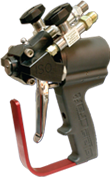Spray Polyurethane Foam FAQ's
See below for a list of our most frequently asked questions. If you have any other questions, please contact us here.
Do I qualify for rebate from Manitoba Hydro?
We recognize the Power Smart Loan Program. For the more up to date information on homeowner eligibility, please visit the Manitoba Hydro Insulation Program. For inquiries on eligibility and enrollment, please contact Manitoba Hydro. For information on whether your insulation meets the Manitoba Hydro Power Smart Insulation requirements, please contact Spray On Systems to speak with one of our experienced representatives.
Is spray polyurethane insulation code approved?
Yes. Building codes provide for the use of spray polyurethane insulation in the Foam Plastic section. This section of the code also describes the use of thermal barriers.
At what point in the construction should spray polyurethane insulation be applied?
Normally spray polyurethane insulation is installed at the same point in the construction cycle as other types of insulation. That is, it should be installed after the rough plumbing, electrical wiring, and heating and air conditioning ducts have been installed. If you decide to seal the entrie exterior shell with spray polyurethane, spray insulation may need to be applied in some areas before the ductwork is installed.
Can a building owner apply spray polyurethane insulation?
Not practically. Spray polyurethane application requires complex equipment and a skilled installer with training in the safe and proper installation of hte polyurethane system.
I am a homeowner and I am very much a Do-It-Yourselfer and was wondering if there is anyway that I can do this myself and rent the equipment. My crawlspace and attic are extremely hot and I need to keep the heat out.
Great question, as we hear this a lot. Unfortunately, spray polyurethane foam (SPF) equipment is not for rent. Installation of SPF needs to be done by a well-trained installer. It's not as easy as it looks. There are some small kits on the market, but they are made for very small projects like sealing joints and cracks.
How long has this type of insulation been around?
Spray foam has been around for more than 30 years for commercial, industrial and transportation uses. It has become very popular residentially in the last 5 - 10 years.
How does spray foam compare with fiberglass batts and blow-in cellulose?
- Fiberglass batts will not stop air leakage (they might filter out some dirt and dust). Blown-in cellulose will slow down air leakage. Spray foam will stop air leakage dead. Spray foam is also modl and moisture resistant unlike fiberglass or cellulose.
- Fiberglass batts have an R-value of about 3.5 (at 1-inch thickness) but this is not a true R-value measurement as there is no air seal. Blown-in cellulose has an R-value of about 3 to 4 (at 1-inch thickness) but also doesn't account for lack of an air seal. Our spray-foam has a true R-value of 6.0 (at 1-inch thickness) depending on the density foam we use.
- Spray foam will add strength and rigidity to your house. Fiberglass batts or blown-in cellulose will not.
Does the insulation contain formadehyde?
No, there is no formaldehyde whatsoever in our spray foam.
How does spray foam work?
A two-part mixture is applied by trained professionals to the surface to be insulated. The spray mixture expands rapidly to fill all cracks and voids, completely and permanently adhering to wood, masonry, metal, concrete and most other construction materials.
How long does Spray Foam Insulation last?
Indefinitely. As an inert product, it will last forever.
What is the R-value (insulation value) of the produce we use?
The types of spray foam Spray On Systems uses has an R-value of 6.0 to 6.5 per inch. Spray foam is the only insulation product that offers a true R-value because it is the only product that creates an air seal.
Won't sealing my building lead to indoor air quality problems?
Your building does not need to be ventilated. Most design professionals will advise you to seal the structure as tight as possible and provide the necessary ventilation through the heating and air conditioning system. Many systems employ an "air exchanger" which is designed to pre-condition (either warm or cool) the incoming outside air with the outgoing exhaust air. In this manner, you can build an extremely energy efficient exterior shell using spray polyurethane foam while still providing controlled and energy efficient ventilation.
How does spray foam insulation control moisture movement and condensation?
Most damaging moisture within a building envelope cavity is the result of warm moist inside-air being exchanged with the cole dry outside-air within the walls. As the moisture in the air condenses, it forms dew within the insulation. Because foam insulation is an air seal, this moisture movement and condensation does not occur. It is ideal for use in climates where buildings are both heated and air conditioned because the situation is reversed in summer with moisture forming on the back of the interior vapor retarder.
Does Spray Foam insulation support bacteria of fungal growth?
Spray foam offers no food value. It is an inert substance and therefore supports neither bacterial nor fungal growth.






